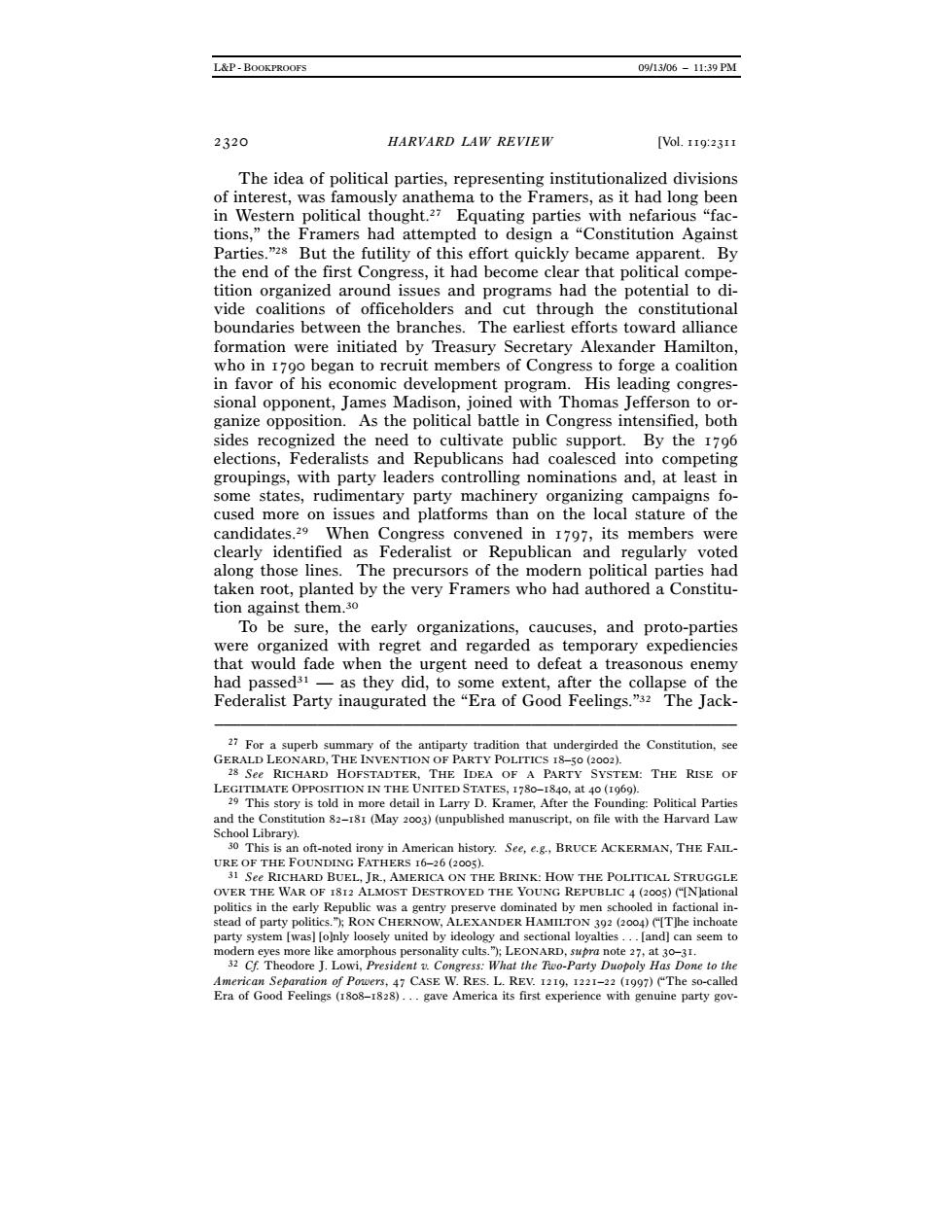正在加载图片...

L&P-BOOKPROOFS 09/13/06-11:39PM 2320 HARVARD LAW REVIEW [Vol.I19:2311 The idea of political parties,representing institutionalized divisions of interest,was famously anathema to the Framers,as it had long been in Western political thought.27 Equating parties with nefarious "fac- tions,"the Framers had attempted to design a "Constitution Against Parties."2s But the futility of this effort quickly became apparent.By the end of the first Congress,it had become clear that political compe- tition organized around issues and programs had the potential to di- vide coalitions of officeholders and cut through the constitutional boundaries between the branches.The earliest efforts toward alliance formation were initiated by Treasury Secretary Alexander Hamilton, who in I7go began to recruit members of Congress to forge a coalition in favor of his economic development program.His leading congres- sional opponent,James Madison,joined with Thomas Jefferson to or- ganize opposition.As the political battle in Congress intensified,both sides recognized the need to cultivate public support.By the 1796 elections,Federalists and Republicans had coalesced into competing groupings,with party leaders controlling nominations and,at least in some states,rudimentary party machinery organizing campaigns fo- cused more on issues and platforms than on the local stature of the candidates.29 When Congress convened in 1797,its members were clearly identified as Federalist or Republican and regularly voted along those lines.The precursors of the modern political parties had taken root,planted by the very Framers who had authored a Constitu- tion against them.30 To be sure,the early organizations,caucuses,and proto-parties were organized with regret and regarded as temporary expediencies that would fade when the urgent need to defeat a treasonous enemy had passeds1-as they did,to some extent,after the collapse of the Federalist Party inaugurated the "Era of Good Feelings."32 The Jack- 27 For a superb summary of the antiparty tradition that undergirded the Constitution,see GERALD LEONARD,THE INVENTION OF PARTY POLITICS 18-50(2002). 28 See RICHARD HOFSTADTER,THE IDEA OF A PARTY SYSTEM:THE RISE OF LEGITIMATE OPPOSITION IN THE UNITED STATES,1780-1840,at 40(1969). 29 This story is told in more detail in Larry D.Kramer,After the Founding:Political Parties and the Constitution 82-181(May 2003)(unpublished manuscript,on file with the Harvard Law School Library). 30 This is an oft-noted irony in American history.See,e.g.,BRUCE ACKERMAN,THE FAIL- URE OF THE FOUNDING FATHERS 16-26(2005). 31 See RICHARD BUEL,JR.,AMERICA ON THE BRINK:HOW THE POLITICAL STRUGGLE OVER THE WAR OF I812 ALMOST DESTROYED THE YOUNG REPUBLIC 4(2005)("N]ational politics in the early Republic was a gentry preserve dominated by men schooled in factional in- stead of party politics.");RON CHERNOW,ALEXANDER HAMILTON 392 (2004)("[T]he inchoate party system [was][olnly loosely united by ideology and sectional loyalties...[and]can seem to modern eyes more like amorphous personality cults.");LEONARD,supra note 27,at 30-31. 32 Cf.Theodore J.Lowi,President Congress:What the Two-Party Duopoly Has Done to the American Separation of Powers,47 CASE W.RES.L.REV.1219,1221-22 (1997)("The so-called Era of Good Feelings (1808-1828)...gave America its first experience with genuine party gov-L&P - BOOKPROOFS 09/13/06 – 11:39 PM 2320 HARVARD LAW REVIEW [Vol. 119:2311 The idea of political parties, representing institutionalized divisions of interest, was famously anathema to the Framers, as it had long been in Western political thought.27 Equating parties with nefarious “factions,” the Framers had attempted to design a “Constitution Against Parties.”28 But the futility of this effort quickly became apparent. By the end of the first Congress, it had become clear that political competition organized around issues and programs had the potential to divide coalitions of officeholders and cut through the constitutional boundaries between the branches. The earliest efforts toward alliance formation were initiated by Treasury Secretary Alexander Hamilton, who in 1790 began to recruit members of Congress to forge a coalition in favor of his economic development program. His leading congressional opponent, James Madison, joined with Thomas Jefferson to organize opposition. As the political battle in Congress intensified, both sides recognized the need to cultivate public support. By the 1796 elections, Federalists and Republicans had coalesced into competing groupings, with party leaders controlling nominations and, at least in some states, rudimentary party machinery organizing campaigns focused more on issues and platforms than on the local stature of the candidates.29 When Congress convened in 1797, its members were clearly identified as Federalist or Republican and regularly voted along those lines. The precursors of the modern political parties had taken root, planted by the very Framers who had authored a Constitution against them.30 To be sure, the early organizations, caucuses, and proto-parties were organized with regret and regarded as temporary expediencies that would fade when the urgent need to defeat a treasonous enemy had passed31 — as they did, to some extent, after the collapse of the Federalist Party inaugurated the “Era of Good Feelings.”32 The Jack- ––––––––––––––––––––––––––––––––––––––––––––––––––––––––––––– 27 For a superb summary of the antiparty tradition that undergirded the Constitution, see GERALD LEONARD, THE INVENTION OF PARTY POLITICS 18–50 (2002). 28 See RICHARD HOFSTADTER, THE IDEA OF A PARTY SYSTEM: THE RISE OF LEGITIMATE OPPOSITION IN THE UNITED STATES, 1780–1840, at 40 (1969). 29 This story is told in more detail in Larry D. Kramer, After the Founding: Political Parties and the Constitution 82–181 (May 2003) (unpublished manuscript, on file with the Harvard Law School Library). 30 This is an oft-noted irony in American history. See, e.g., BRUCE ACKERMAN, THE FAILURE OF THE FOUNDING FATHERS 16–26 (2005). 31 See RICHARD BUEL, JR., AMERICA ON THE BRINK: HOW THE POLITICAL STRUGGLE OVER THE WAR OF 1812 ALMOST DESTROYED THE YOUNG REPUBLIC 4 (2005) (“[N]ational politics in the early Republic was a gentry preserve dominated by men schooled in factional instead of party politics.”); RON CHERNOW, ALEXANDER HAMILTON 392 (2004) (“[T]he inchoate party system [was] [o]nly loosely united by ideology and sectional loyalties . . . [and] can seem to modern eyes more like amorphous personality cults.”); LEONARD, supra note 27, at 30–31. 32 Cf. Theodore J. Lowi, President v. Congress: What the Two-Party Duopoly Has Done to the American Separation of Powers, 47 CASE W. RES. L. REV. 1219, 1221–22 (1997) (“The so-called Era of Good Feelings (1808–1828) . . . gave America its first experience with genuine party gov-